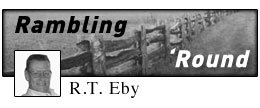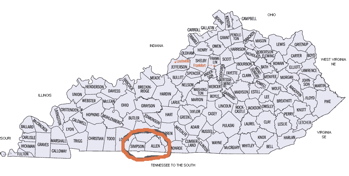
It is an area where you see signs that say Honey Run Creek and Cherry Mound Baptist Church. Northern Tennessee and southern Kentucky meet on a rolling green landscape that has seen American society evolve from the days before the United States was even founded and named.
If you were to highlight today's Bible Belt on a U.S. map the outline would approximate the Confederacy of 1863, geographical shorthand for a large meaty swath of the cultural south. The Old South of the seaboard colonial period was a stronghold of the Anglican Church. The transition to conservative Protestant country occurred during the 19th century, coming about as a series of religious revivals, many linked to Baptist movements. The stamp on the culture here of widely shared religious practice and faith remains strong.
 Nashville, Tennessee, is sometimes called the buckle of the Bible Belt because it is home to the national offices of the Southern Baptist Convention, The National Association of Free Will Baptists and the United Methodist Church's publishing house. Nashville is also sometimes referred to as the Protestant Vatican.
Nashville, Tennessee, is sometimes called the buckle of the Bible Belt because it is home to the national offices of the Southern Baptist Convention, The National Association of Free Will Baptists and the United Methodist Church's publishing house. Nashville is also sometimes referred to as the Protestant Vatican.
Slightly above the buckle, at the center of the Kentucky-Tennessee boundaries lie Simpson and Allen Counties, both just inside the Kentucky line. As the city of Franklin is to Simpson County, so the city of Scottsville is to Allen County -- Franklin a little bigger than Scottsville, by maybe again half as much. The counties contain the same amount of registered voters: approximately 11,000 each.

Simpson County is 75 percent Democrat; Allen County roughly 60 percent Republican. The demographics of the two counties, however, are nearly indistinguishable. In both counties, as in most of the Bible Belt, social issues have rearranged party structures. Just noting the number of Republicans or Democrats is not really the best measure of how the residents have voted or how they might vote.
Simpson County is a little more than 75 percent white, a little less than 25 percent black and less than 1 percent other, or Latino. It has a strong manufacturing economy. Bobby "Chip" Phillips, Jr., Simpson county clerk, notes that Franklin is a big factory town with both Harmon-Becker and Franklin Precision Industry turning out auto parts. There are also businesses that produce the materials that the two plants use to make the parts from.
Phillips knows that if the car market goes the way of the housing market that majority Democratic Simpson County will face economic problems. But for the time being there is plenty of work and "everyone who wants a job, has one." Unemployment is not an issue in the Franklin.
It's a different situation in majority Republican Allen County, where Beverly Calvert, county clerk, talks about a plant closing. She tells me A.O. Smith, a General Electric appliance parts manufacturer, is shutting down after 33 years of operation. Two hundred jobs, a big number in a small county, will be lost. Calvert's brother, in his 50s, is in upper management at the plant and will probably have trouble finding another job.
But Allen County's Scottsville still has a Dollar Store distribution center. Dollar Stores is a chain of variety stores concentrated throughout the south -- originated, in fact, in Scottsville. Betty Turner Campbell, daughter of the original Dollar General owner, is the driving force and the money behind Camp Courageous, a summer camp for seriously ill children between the ages of 7 and 15. The camp is modeled after Paul Newman's Hole In The Wall Gang and other similar programs and will create a few counselor positions. But Camp Courageous will mostly rely on volunteers, no replacement for A.O. Smith.
Allen County also has a Sumitomo facility that manufactures wiring systems, a Halton facility, and a Smuckers plant that all seem to be staying put. Still, employment is a concern in Allen County.
Calvert tells me that in both counties, in the region generally, people tend to vote for individuals not parties. In Republican Allen County there is a Democratic circuit clerk and a Democratic sheriff. In Democratic Simpson County there is a Republican county judge.
Bill Clinton carried Simpson County in both 1992 and 1996 but George W. Bush beat Al Gore there in 2000 with a margin of 55-45. Then, in 2004, Bush beat John Kerry solidly 61-39, but the ballot that election included a state constitutional amendment on defining marriage strictly as a union between a man and a woman. Voter turn out ballooned and the amendment garnered landslide approval, roughly 85 percent of the vote. The Republican majority in Allen County went the same way.
In 2006 both Simpson County and its principal city Franklin voted a split decision in what County Clerk Phillips refers to as a very emotional election. The question voters were deciding was whether to be a wet or a dry county. In other words, to sell alcohol or not to sell alcohol, that was the question. Although the county remains dry, the city voted to go "damp," allowing only restaurants that seat more than a hundred people and derive a minimum of 75 percent of their income from food to serve mixed drinks. Repeated previous elections had kept both the city and county dry.
Both Phillips and Calvert will be converting their counties to an e-scan voting process for the fall. To create a record of the vote, the system uses a paper ballot, which is then fed into and read by a scanner. Calvert sees it as a step back into the stone age and Phillips doesn't seem to be very enthusiastic about it either. Calvert sarcastically thanks Florida for creating more work for the state of Kentucky.
Indeed, clerks in the small counties don't look forward to having to retrain the election volunteers who are the mainstay of the polling centers. Nor do they want to divert their understaffed departments from their everyday work to conduct recounts.
But those are problems for the fall. Scottsville has a local law that doesn't even allow the placement of campaign signs within the city limits until 45 days prior to the election. For now, the people in the area are taken up with the concerns of Americans everywhere -- things like how to come up with the money to put gas in the car to get to work.
I am delighted to reactivate Ramblin' 'Round for publication at OffTheBus. It is a column title that has been with me since my days as a reporter for the 4th Armored Division Rolling Review in Germany. I have carried the title with me through the years and every time I break it out, it seems to fit whatever I'm writing about at the time. In this incarnation, I will be covering the political lay of the land in the Bible Belt with attention given to the nuances of individual areas.
